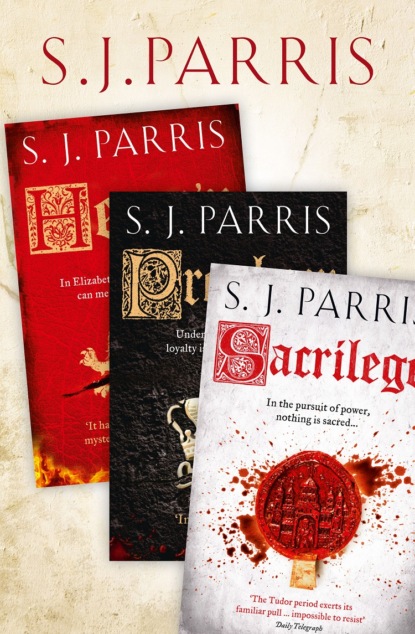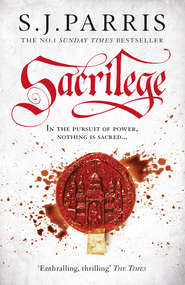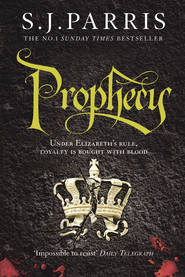По всем вопросам обращайтесь на: info@litportal.ru
(©) 2003-2024.
✖
Giordano Bruno Thriller Series Books 1-3: Heresy, Prophecy, Sacrilege
Автор
Год написания книги
2019
Настройки чтения
Размер шрифта
Высота строк
Поля
‘And beautiful?’ Sidney asked, his eyes glittering.
‘Exquisite.’ I bit my lip, remembering Morgana’s blue eyes, the way she would try and coax me to laughter when she thought I grew too melancholy. ‘I courted her in secret, but I think I always knew it was only for a season. Her father wanted her to marry a Huguenot aristocrat, not a fugitive Italian Catholic. Even when I became a Professor of Philosophy at the University of Toulouse and finally had the means of supporting myself, he would not consent, and he threatened to use all his influence in the city to destroy my name.’
‘So what happened?’ Sidney asked, intrigued.
‘She begged me to run away with her.’ I sighed. ‘I almost allowed myself to be persuaded, but I knew in my heart that it would not have been the future either of us wanted. So I left one night for Paris, where I ploughed all my energies into my writing and my advancement at court. But I often wonder about the life I turned my back on, and where I might have been now.’ My voice trailed away as I lowered my eyes again, remembering.
‘Then we should not have had you here, my friend. Besides, she’s probably married to some ageing duke by now,’ Sidney said heartily.
‘She would have been,’ I agreed, ‘had she not died. Her father arranged a marriage to one of his friends but she had an accident shortly before the wedding. Drowned. Her brother wrote and told me.’
‘You think it was by her own hand?’ Sidney asked, his eyes dramatically wide.
‘I suppose I will never know.’
I fell silent then, and gazed out across the water.
‘Well, sorry about that,’ Sidney said after a few moments, clapping me on the back in that matter-of-fact way the English have, ‘but still – the women of King Henri’s court must have provided you with plenty of distractions, eh?’
I regarded him for a moment, wondering if the English nobility really did have as little fine feeling as they pretended, or if they had developed this manner as a way of avoiding painful emotion.
‘Oh yes, the women there were beautiful, certainly, and happy enough to offer their attentions at first, but I found them sadly lacking in worthwhile conversation,’ I said, forcing a smile. ‘And they found me sadly lacking in fortune and titles for any serious liaison.’
‘Well, there you are, Bruno – you are destined for disappointment if you seek out women for their conversation.’ Sidney shook his head briefly, as if the idea were absurd. ‘Take my advice – sharpen your wits in the company of men, and look to women only for life’s softer comforts.’
He winked broadly and grinned.
‘Now I must oversee the arrangements or we shall never be on our way, and we are to dine at the palace of Windsor this evening so we need to make good progress. They say there will be a storm tonight. The queen will not be present, naturally,’ he said, noting my raised eyebrows. ‘I’m afraid the responsibility of entertaining the palatine is ours alone, Bruno, until we reach Oxford. Steel yourself and pray to that universal soul of yours for fortitude.’
‘I would not be the one to boast, but my friends do consider me to be something of a poet, Sir Philip,’ the Palatine Laski was saying in his high-pitched voice, which always sounded as if he was voicing a grievance, as our boat approached Hampton Court. ‘I had in mind that if we tire of the disputations at the university’ – here he cast a pointed glance at me – ‘you and I might devote some of our stay in Oxford to reading one another’s poetry and advising on it, as one sonneteer to another, what say you?’
‘Then we must include Bruno in our parley,’ Sidney said, flashing me a conspiratorial grin, ‘for in addition to his learned books, he has written a comic drama in verse for the stage, have you not, Bruno? What was it called?’
‘The Torch-bearers,’ I muttered, and turned back to contemplate the view. I had dedicated the play to Morgana and it was always associated with memories of her.
‘I have not heard of it,’ said the palatine dismissively.
Before our party had even reached Richmond I found myself in complete agreement with my patron, King Henri III of France: the Palatine Laski was unbearable. Fat and red-faced, he had a wholly misplaced regard for his own importance and a great love of the sound of his own voice. For all his fine clothes and airs, he was clearly not well acquainted with the bath-house, and under that warm sun a fierce stink came off him which, mingled with the vapours from the brown Thames at close quarters, was distracting me from what should have been an entertaining journey.
We had launched from the wharf at Winchester House with a great fanfare of trumpets; a boat filled with musicians had been charged to keep pace with us, so that the palatine’s endless monologue was accompanied by the twitterings and chirpings of the flute players to our right. To add to my discomfort, the flowers with which the barge had been so generously bedecked were making me sneeze. I sank back into the silk cushions, trying to concentrate on the rhythmic splashing of the oars as we glided at a stately pace through the city, smaller boats making way on either side while their occupants, recognising the royal barge, respectfully doffed their caps and stared as we passed. For my part, I had almost succeeded in reducing the palatine’s babble to a background drone as I concentrated on the sights, and would have been content to enjoy the gentle green and wooded landscape on the banks as we left the city behind, but Sidney was determined to amuse himself by baiting the Pole and wanted my collaboration.
‘Behold, the great palace of Hampton Court, which once belonged to our queen’s father’s favourite, Cardinal Wolsey,’ he said, gesturing grandly towards the bank as we drew close to the imposing red-brick walls. ‘Not that he enjoyed it for long – such is the caprice of princes. But it seems the queen holds you in great esteem, Laski, to judge by the care she has taken over your visit.’
The palatine simpered unattractively.
‘Well, that is not for me to say, of course, but I think it is well-known by now at the English court that the Palatine Laski is granted the very best of Her Majesty’s hospitality.’
‘And now that she will not have the Duke of Anjou, I wonder whether we her subjects may begin to speculate about an alliance with Poland?’ Sidney went on mischievously.
The palatine pressed the tips of his stubby fingers together as if in prayer and pursed his moist lips, his little piggy eyes shining with self-congratulating pleasure.
‘Such things are not for me to say, but I have noticed in the course of my stay at court that the queen did pay me certain special attentions, shall we say? Naturally she is modest, but I think men of the world such as you and I, Sir Philip, who have not been shut up in a cloister, can always tell when a woman looks at us with a woman’s wants, can we not?’
I snorted with incredulity then, and had to disguise it as a sneezing fit. The minstrels finished yet another insufferably jaunty folk song and turned to a more melancholic tune, allowing me to lapse into reflective silence as the fields and woods slid by and the river became narrower and less noisome. Clouds bunched overhead, mirrored in the stretch of water before us, and the heat began to feel thick in my nostrils; it seemed Sidney had been right about the coming storm.
‘In any case, Sir Philip, I have taken the liberty of composing a sonnet in praise of the queen’s beauty,’ announced the palatine, after a while, ‘and I wonder if I might recite it for you before I deliver it to her delicate ears? I would welcome the advice of a fellow poet.’
‘You had much better ask Bruno,’ Sidney said carelessly, trailing his hand in the water, ‘his countrymen invented the form. Is that not so, Bruno?’
I sent him a murderous look and allowed my thoughts to drift to the horizon as the palatine began his droning recital.
If anyone had predicted, during those days when I begged my way from city to city up the length of the Italian peninsula, snatching teaching jobs when I could find them and living in the roadside inns and cheap lodgings of travellers, players and pedlars when I could not, that I would end up the confidant of kings and courtiers, the world would have thought them insane. But not me – I always believed in my own ability not only to survive but to rise through my own efforts. I valued wit more than the privileges of birth, an enquiring mind and hunger for learning above status or office, and I carried an implacable belief that others would eventually come to see that I was right; this lent me the will to climb obstacles that would have daunted more deferential men. So it was that from itinerant teacher and fugitive heretic, by the age of thirty-five I had risen almost as high as a philosopher might dream: I was a favourite at the court of King Henri III in Paris, his private tutor in the art of memory and a Reader in Philosophy at the great university of the Sorbonne. But France too was riven with religious wars then, like every other place I had passed through during my seven-year exile from Naples, and the Catholic faction in Paris under the Guise family were steadily gaining strength against the Huguenots, so much so that it was rumoured the Inquisition were on their way to France. At the same time, my friendship with the king and the popularity of my lectures had earned me enemies among the learned doctors at the Sorbonne, and sly rumours began to slip through the back streets and into the ears of the courtiers: that my unique memory system was a form of black magic and that I used it to communicate with demons. This I took as my cue to move on, as I had done in Venice, Padua, Genoa, Lyon, Toulouse and Geneva whenever the past threatened to catch up; like many religious fugitives before me, I sought refuge under the more tolerant skies of Elizabeth’s London, where the Holy Office had no jurisdiction, and where I hoped also to find the lost book of the Egyptian high priest Hermes Trismegistus.
The royal barge moored at Windsor late in the afternoon, where we were met by liveried servants and taken to our lodgings at the royal castle to dine and rest for the night before progressing to Oxford early the next day. Our supper was a subdued affair, perhaps partly because the sky had grown very dark by the time we arrived in the state apartments, requiring the candles to be lit early, and a heavy rain had begun to fall; by the time our meal was over the water was coursing down the tall windows of the dining hall in a steady sheet.
‘There will be no boat tomorrow if this continues,’ Sidney observed, as the servants cleared the dishes. ‘We will have to travel the rest of the way by road, if horses can be arranged.’
The palatine looked petulant; he had clearly enjoyed the languor of the barge.
‘I am no horseman,’ he complained, ‘we will need a carriage at the very least. Or we could wait here until the weather clears,’ he suggested in a brighter tone, leaning back in his chair and looking about him covetously at the rich furnishings of the palace dining room.
‘We have no time,’ Sidney replied. ‘Bruno’s great disputation before the whole university is the day after tomorrow and we must give our speaker enough leisure to prepare his devastating arguments, eh, Bruno?’
I turned my attention from the windows to offer him a smile.
‘In fact, I was just about to excuse myself for that very purpose,’ I said.
Sidney’s face fell.
‘Oh – will you not sit up and play cards with us a while?’ he asked, a note of alarm in his voice at the prospect of being left alone with the palatine for the evening.
‘I’m afraid I must lose myself in my books tonight,’ I said, pushing my chair back, ‘or this great disputation, as you call it, will not be worth hearing.’
‘I’ve sat through few that were,’ remarked the palatine. ‘Never mind, Sir Philip, you and I shall make a long night of it. Perhaps we may read to one another? I shall call for more wine.’
Sidney threw me the imploring look of a drowning man as I passed him, but I only winked and closed the door behind me. He was the professional diplomat here, he had been bred to deal with people like this. A great crack of thunder echoed around the roof as I made my way up an ornately painted staircase to my room.
For a long while I did not consult my papers or try to put my thoughts in order, but only lay on my bed, my mind as unsettled as the turbulent sky, which had turned a lurid shade of green as the thunder and lightning grew nearer and more frequent. The rain hammered against the glass and on the tiles of the roof and I wondered at the sense of unease that had edged out the morning’s thrill of anticipation. My future in England, to say nothing of the future of my work, depended greatly on the outcome of this journey to Oxford, yet I was filled with a strange foreboding; in all these rootless years of belonging nowhere, depending on no one but my own instinct for survival, I had learned to listen to the prickling of my moods. When I had intimations of danger, events had usually proved me right. But perhaps it was only that, once again, I was preparing to take on another shape, to become someone I was not.
I had been in London less than a week, staying as a guest of the French ambassador at the request of my patron, King Henri, who had reluctantly agreed to my plea to leave Paris indefinitely, when I received a summons from Sir Francis Walsingham, Queen Elizabeth’s Principal Secretary of State. It was not the kind of invitation one declined, yet the manner of its arrival gave me no clue as to how a statesman of such importance knew of my arrival or what he wanted of me. I rode out the next day to his grand house on the prosperous street of Seething Lane, close by the Tower in the east of the City of London, and was shown through the house by a harried-looking steward into a neat garden, where box trees in geometric patterns gave way to an expanse of wilder grass. Beyond this I saw a cluster of low fruit trees in the full swell of their blossom, a magnificent canopy of white and pink, and among them, gazing up into their twisted branches, stood a tall figure dressed all in black.
At the steward’s nod, I stepped towards the man under the trees, who had turned to face me – or so I believed, for the late afternoon sun was slanting down directly behind him, leaving him silhouetted, a lean black shape against the golden light. I could not gauge his expression, so I paused a few feet away from him and bowed deeply in a manner I hoped was fitting.
‘Giordano Bruno of Nola, at your honour’s service.’
‘Buonasera, Signor Bruno, e benvenuto, benvenuto,’ he said warmly, and strode forward, holding out his right hand to clasp mine in the English style. His Italian was only faintly coloured by the clipped tones of his native tongue, and as he approached I could see his face clearly for the first time. It was a long face, made the more severe by the close-fitting black cap he wore over receding hair. I guessed him to be about fifty years of age, and his eyes were lit with a sharp intelligence that seemed to make plain without words that he would not suffer fools. Yet his face also bore the traces of great weariness; he looked like a man who carried a heavy burden and slept little.
‘A fortnight past, Doctor Bruno, I received a letter from our ambassador in Paris informing me of your arrival in London,’ he began, without preamble. ‘You are well known at the French court. Our ambassador says he cannot commend your religion. What do you think he could mean by that?’











